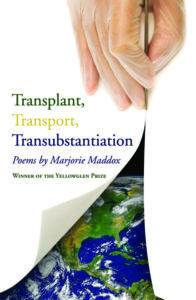
A friend I first met in college lived nearby, and two years ago we finally got together when a third friend came from out of town. We hadn’t seen each other in more than 40 years, and it was as if college had just happened yesterday. We looked older and more life-marked, but the same personalities sat around a table, eating flatbread and drinking wine. Some months before, my in-town friend had had a heart transplant. He described what it was like not to have a pulse, something you don’t think about unless there isn’t one.
A year later, we had scheduled another lunch, with another out-of-town college friend. I opened the newspaper a few weeks before our lunch date and saw his obituary. He had had a stroke, a not uncommon complication, even well after the operation. The transplant had given him almost two more years.
Marjorie Maddox’s father had far less time than that after his heart transplant. The transplant went well; the unexpected blood infection was fatal. Maddox tells the story in a series of poems in Transplant, Transport, Transubstantiation. She considers the donor, the operation, the family in the waiting room, the unexpected infection, and then afterward, after the transplant, after his death, when everything seems the same but nothing is the same, when the hope that was offered by a hole in a stranger’s body becomes dies with a father’s grave.
Disconnected

so many severed cords
uncoiled and floundering
about uninsulated space
I think—until a priest-turned-
surgeon explains in stops and shocks
the transubstantiation of transplants,
what others’ hearts were, are, continue to become
inside our opened hollows,
disconnected from used nerves
that bridge to blood.
Instead, this always-symbol,
always-physical of personage
completes itself, confidently connecting
to what it needs, its structural node
part of that separate
chambered system of someone else,
heart of the fact that keeps it still
believing what it does.
In the transplant waiting room,
a child asks her mother,
“Will Daddy love the same people?”
and I startle at the complications.
While the slow clock sterilizes
the lives of those waiting shock-still
or nervous-twitching.
I think, out-of-time, or persons whom I’ve become
On stage, transforming what I wasn’t into
What I wasn’t.
In seventh grade, the penalty for breaking
character in Theater class was failure.
And so we sat obediently as old women
but staring boldly, disconcertingly
back-and-forth at the blushing prop boy,
the unplugged cord, when,
in Arsenic and Old Lace,
the telephone kept ringing, ringing, ringing.

Marjorie Maddox
Maddox writes, too, of marriage, heredity, love and anniversaries, neighborhoods, and teaching. She includes a rather extraordinary series of poems under the general title of “Body Parts,” in which each part of the body is given its say, or its description. And then she concludes with poems about sacraments and holy days, spiritual considerations, flying on an airplane to or from Oslo, Ireland, and Yugoslavia (as the area used to be called).
Maddox is the author of 10 previous poetry collections, including Nightrider to Edinburgh (1986), Body Parts (1999); Transplant, Transport, Transubstantiation (2004 and now being republished by Wipf and Stock Publishers); Weeknights at the Cathedral (2006); Local News from Someplace Else (2013); Perpendicular as I (1999 and 2013); and True, False, None of the Above (2018). She is the co-author of the anthology Common Wealth: Contemporary Poets on Pennsylvania (2005) and author of two children’s books, including Rules of the Game: Baseball Poems (2009).
Transplant, Transport, Transubstantiation is about change both sudden and gradual. It is about what binds us in relationships, and what happens when those binds come undone or are severed. And it’s about reliance, what we have and what we find to help us go on.
Related:
Poetic Voices: Teow Lim Gow and Marjorie Maddox
Photo by Harold Lloyd, Creative Commons, via Flickr. Post by Glynn Young, author of the novels Dancing Priest, A Light Shining, and the newly published Dancing King, and Poetry at Work.
__________________________

“I require all our incoming poetry students—in the MFA I direct—to buy and read this book.”
—Jeanetta Calhoun Mish
- “Horace: Poet on a Volcano” by Peter Stothard - September 16, 2025
- Poets and Poems: The Three Collections of Pasquale Trozzolo - September 11, 2025
- Poets and Poems: Boris Dralyuk and “My Hollywood” - September 9, 2025
L.L. Barkat says
What a remarkable poem (and a bracing and tender sounding collection).
I love the child’s question, on so many levels. “Will Daddy love the same people?”
A psychologist friend of mine has shared about research that is strange indeed: sometimes a heart transplant *does* leave us loving other things (something to do with the way the brain actually extends neurologically into the heart has given those with transplants new musical tastes and even, at times, new memories. Even unsolved murders have been solved when patients suddenly know things they didn’t know before. Strange, huh? 🙂
Then there’s the way our own hearts are sort of within the person who is lost to us, and we may be wondering: “Will I love the same way, now that a piece of my heart is gone?”